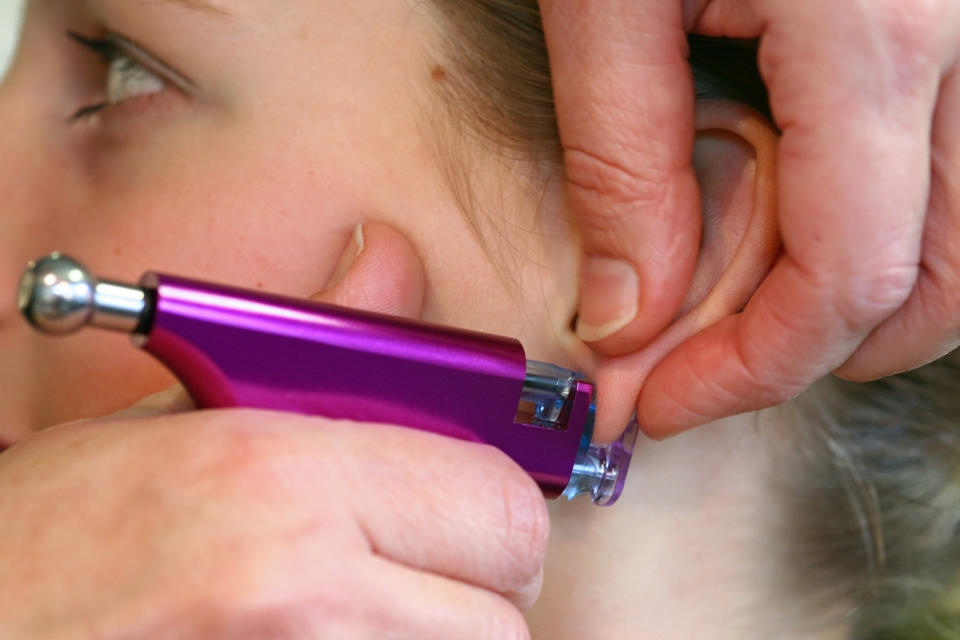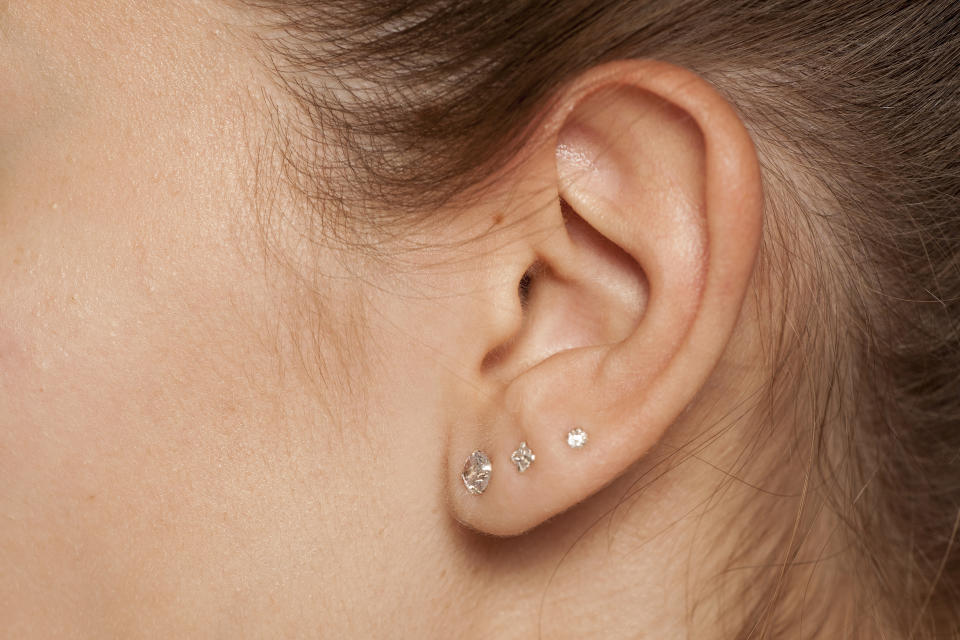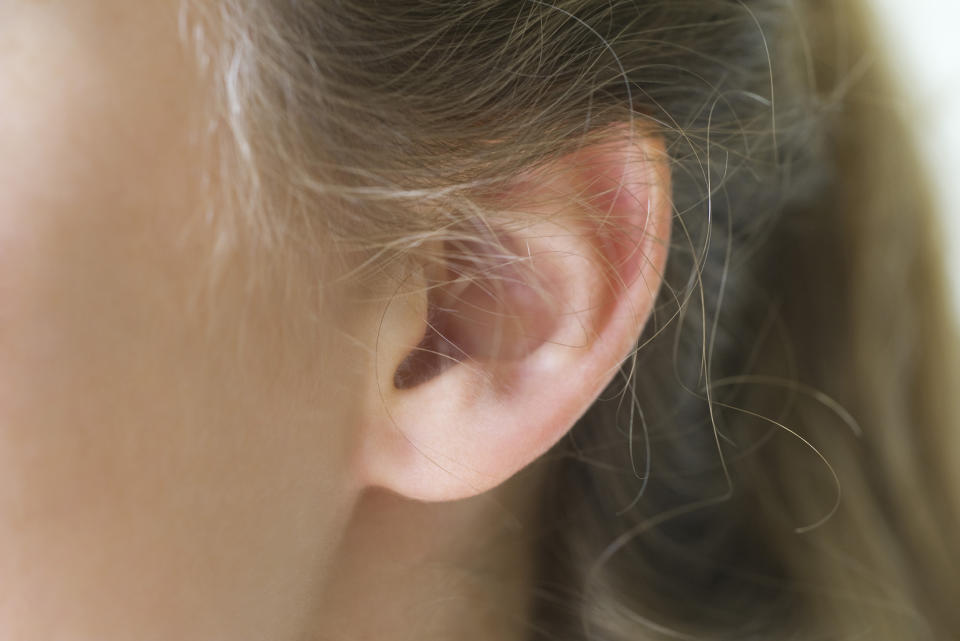If you're taking a break from jewelry staples, like earrings, and adopting a more casual approach to your wardrobe lately, you're not alone. But as we begin to ease back into our old routines, some earring lovers are now dealing with an unexpected dilemma: piercings that have seemingly closed up in a matter of weeks.
If you're struggling to put earrings back in after a brief break or think your piercing might be a goner, it can feel like uncharted territory. So TODAY Style reached out to the pros to figure out how to prevent your piercings from closing up and what to do if you think it's already too far gone.
New piercing holes are more likely to close quickly
If you've ever gotten your ears pierced, you know how important it is to keep earrings in for a while. But why are new piercings so eager to close up in the first place?
"If you have a brand new piercing, your hole can close in a few hours," Studs co-founder and CMO, Lisa Bubbers, told TODAY Style."When you create a hole in your ear, your immune system kicks into gear and tries to heal and repair that hole."
The rate at which a piercing heals varies from person to person and can also depend on what type of piercing you get, but typically, a new earlobe piercing will heal in 6-12 weeks. Piercings further up the ear (especially those involving cartilage) can take several months.
To help speed up the healing process, Bubbers recommends wearing earrings made of implant-grade metal so your body will form a healed layer around the metal. You also should avoid going any longer than 24 hours without wearing earrings for the first six months of a new piercing to prevent the hole from closing.
Can older piercing holes close?
You may think you're in the clear once your new piercing fully heals, but according to Jef Saunders, professional piercer and public relations coordinator for the Association of Professional Piercers, there'sa difference between the words "healed" and "permanent."
"By healed, we mean that the channel of the piercing (what piercers call the fistula) is intact and no longer in the healing process. Most people can tell their piercing has healed when there is no redness, the tissue feels normal in the area of the piercing and the normal healing discharge (crust that gathers on the jewelry) has subsided," he said. "A piercing becoming permanent, where jewelry can be removed for hours or days, is never guaranteed."
And that means there's always a chance that your piercing can close when you remove jewelry for an extended period of time.
"In my career as a piercer, I've seen 20-year-old healed ear piercings close up over a weekend, and I've seen six-week-old cheek piercings remain out for an eight-hour work shift and then be reinserted with ease. Both of those things were totally shocking to me, but they happened," Saunders said.
It's hard to predict how quickly your body will attempt to close a piercing, but as a general rule, the newer it is, the more likely it will close up. For instance: If your piercing is less than a year old, it can close in a few days, and if your piercing is several years old, it can take several weeks.
But what about the piercings you've had since childhood? Are they really likely to close up or is it safe to take a few weeks off from wearing your favorite accessory?
"After years, it is likely that the hole will remain open, however, this varies based on how long you’ve had the piercing and also on your body's healing abilities," said Frances Miranda, Studex corporate trainer and business development manager.
The likelihood of a piercing closing up can also depend on where it's located on your body. For instance, nose, helix and cartilage piercings have a tendency to close up more quickly. "A tongue piercing that is less than a year old will probably close up to the point where jewelry cannot be inserted much faster than a year old earlobe, but you can't count on it," Saunders said.
What to do if you think your piercing hole is closed
After a few weeks of laid-back quarantine style, putting your favorite earrings on again might feel like a struggle. But how can you tell if your piercing has really closed up or if it's just gotten a little smaller?
"Chances are, everything is fine and your piercing is still open. It’s probably just a little smaller than the jewelry that you normally wear, which is why you’re experiencing so much difficulty and resistance," said Johnny Pearce, a piercing expert at New York City's Nine Moons Piercing. "This is especially typical when you haven’t worn jewelry consistently over a period of time. I typically refer to this as your piercing shrinking, because that’s quite literally what happens."
The most important thing you can do in this scenario is avoid using force because trying to push an earring in can turn your healed piercing into an open wound and cause swelling, infection and scarring. Your best option is to seek professional help to see if your piercing site is truly closed or if it just needs to be opened a bit with a needle.
"Pro piercers have tools called insertion tapers that can help reopen seemingly closed piercings. If that isn't possible, the piercer doing the consultation will be able to give you a good timeline as to when a safe re-piercing can occur," Saunders said.
And if you're hoping to avoid this scenario entirely, Saunders has a few words of wisdom: "My suggestion would be to leave jewelry in at all times, especially when your local professional piercing studio may not be available to help you reinsert a piercing that closed up quicker than you expected."
Alright, buckle up because we're diving deep into the world of piercings and jewelry maintenance. Let's start with the basics.
When it comes to keeping your piercings open and happy, there are a few key concepts to understand. Firstly, the healing process after getting a new piercing is crucial. Your immune system kicks into action, working to heal and repair the hole created during piercing. This process is more rapid in new piercings, and the type of metal you choose for your earrings can significantly affect the healing.
Now, here's where my expertise kicks in. Using implant-grade metal is a game-changer. It promotes the formation of a healed layer around the metal, aiding the overall healing process. If you've recently gotten a new piercing, don't play it risky—keep those earrings in for the first six months, and don't let it go longer than 24 hours without them.
But, and here's the kicker, even if you think your piercing has fully healed, there's a distinction between "healed" and "permanent." Just because your piercing seems healed doesn't guarantee it won't close up when jewelry is removed for an extended period. This is where the unpredictability of our bodies comes into play.
Let's talk timelines. If your piercing is less than a year old, it can close up in a matter of days. Several years old? It might take several weeks. As for those childhood piercings, the likelihood of them closing up depends on various factors, including your body's healing abilities and the location of the piercing. Nose, helix, and cartilage piercings are more prone to quick closures.
Now, what if you find yourself in a situation where your piercing seems closed? Fear not, my friend. Using force is a big no-no. Instead, seek professional help. Piercers have handy tools called insertion tapers that can work wonders in reopening seemingly closed piercings. Trying to force an earring in could turn your healed piercing into an open wound, and we definitely want to avoid that.
In conclusion, whether you're a piercing veteran or a newcomer to the world of body jewelry, understanding the nuances of healing, metal quality, and the unpredictable nature of piercings is essential. So, keep those earrings in, choose your metals wisely, and, when in doubt, consult a pro to keep your piercings in tip-top shape.


